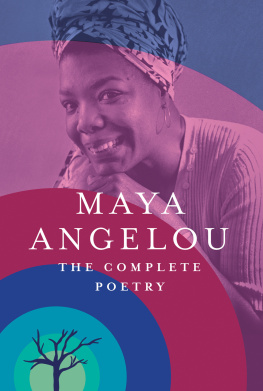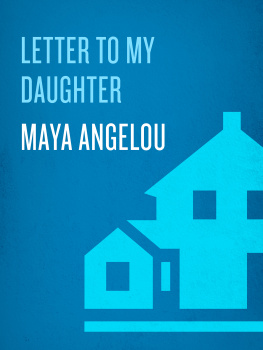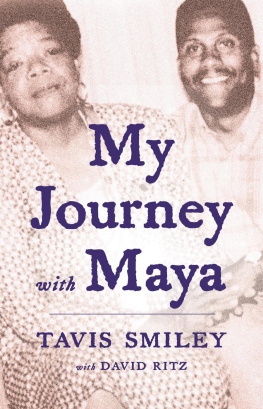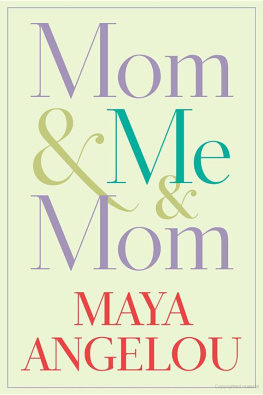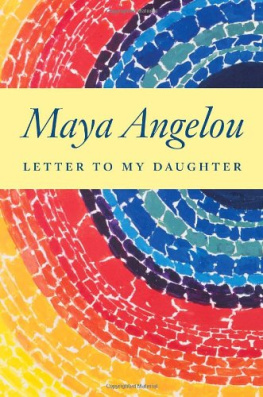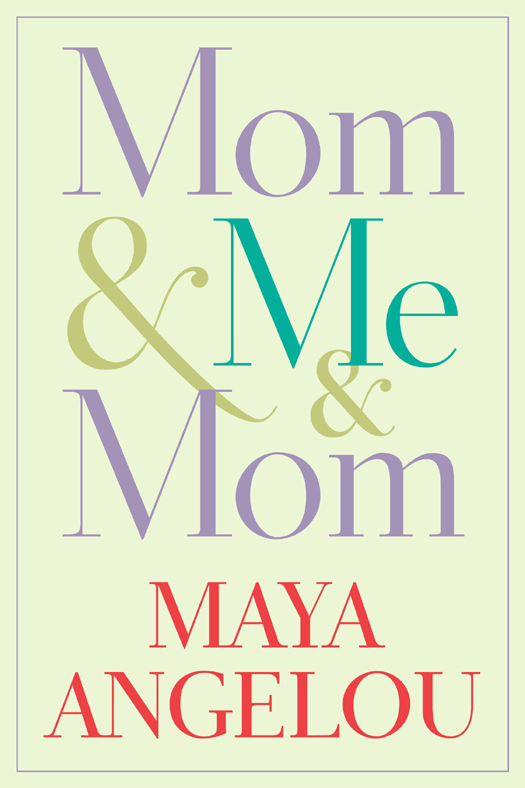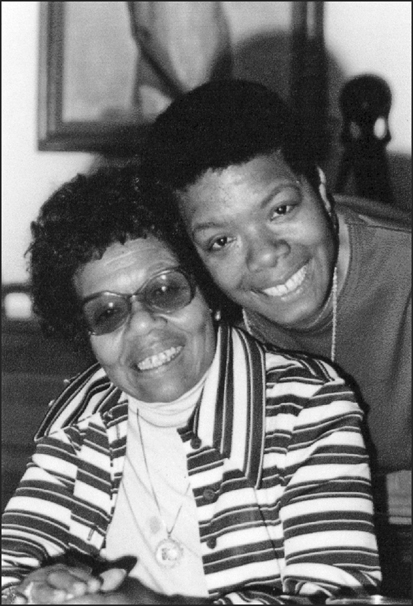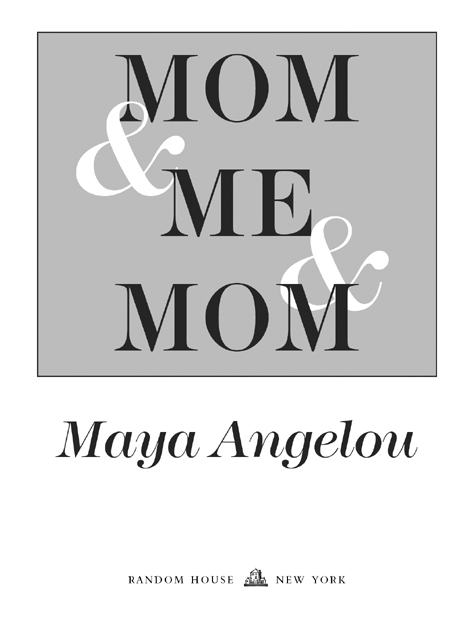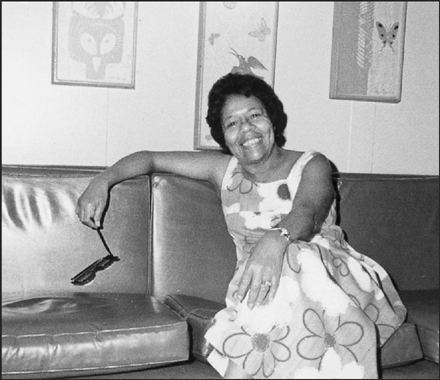Copyright 2013 by Maya Angelou
All rights reserved.
Published in the United States by Random House, an imprint of The Random House Publishing Group, a division of Random House, Inc., New York.
R ANDOM H OUSE and colophon are registered trademarks of Random House, Inc.
The excerpt that appears on is taken from Letter to My Daughter by Maya Angelou (New York: Random House, Inc., 2008), copyright 2008 by Maya Angelou, and is reprinted by permission of Random House, Inc.
LIBRARY OF CONGRESS CATALOGING-IN-PUBLICATION DATA
Mom & me & mom / by Maya Angelou.
p. cm.
eISBN: 978-0-679-64547-4
1. Angelou, MayaFamily. 2. Authors, American20th centuryBiography. 3. EntertainersUnited StatesBiography. 4. African American authorsBiography. I. Title: Mom & Me & Mom. PS3551.N464Z46 2012 818.5409dc23 2012022257
[B]
All photographs courtesy of Maya Angelou, except those on , which are courtesy of Eugene B. Redmond.
www.atrandom.com
Jacket design: Nancy Harris Rouemy / Go For It Design Ltd
v3.1
Contents
PROLOGUE
Frequently, I have been asked how I got to be this way. How did I, born black in a white country, poor in a society where wealth is adored and sought after at all costs, female in an environment where only large ships and some engines are described favorably by using the female pronounhow did I get to be Maya Angelou?
Many times I have wanted to quote Topsy, the young black girl in Uncle Toms Cabin. I have been tempted to say, I dunno. I just growed. I never used that response, for a number of reasons. First, because I read the book in my early teens and the ignorant black girl embarrassed me. Second, I knew that I had become the woman I am because of the grandmother I loved and the mother I came to adore.
Their love informed, educated, and liberated me. I lived with my paternal grandmother from the time I was three years old until I was thirteen. My grandmother never kissed me during those years. However, when she had company, she would summon me to stand in front of her visitors. Then she would stroke my arms asking, Have you ever seen arms more beautiful, straight as a plank and brown as peanut butter? Or she would give me a tablet and a pencil. She would call out numbers to me in front of her company.
All right sister, put 242, then 380, then 174, then 419; now add that. She would speak to the visitors, Now watch. Her uncle Willie has timed her. She can finish that in two minutes. Just wait.
When I told the answer, she would beam with pride. See? My little professor.
Love heals. Heals and liberates. I use the word love, not meaning sentimentality, but a condition so strong that it may be that which holds the stars in their heavenly positions and that which causes the blood to flow orderly in our veins.
This book has been written to examine some of the ways love heals and helps a person to climb impossible heights and rise from immeasurable depths.
My mother was to remain a startling beauty.
(1976)
The first decade of the twentieth century was not a great time to be born black and poor and female in St. Louis, Missouri, but Vivian Baxter was born black and poor, to black and poor parents. Later she would grow up and be called beautiful. As a grown woman she would be known as the butter-colored lady with the blowback hair.
Her father, a Trinidadian with a heavy Caribbean accent, had jumped from a banana boat in Tampa, Florida, and evaded immigration agents successfully all his life. He spoke often and loudly with pride at being an American citizen. No one explained to him that simply wanting to be a citizen was not enough to make him one.
Contrasting with her fathers dark chocolate complexion, her mother was light-colored enough to pass for white. She was called an octoroon, meaning that she had one-eighth Negro blood. Her hair was long and straight. At the kitchen table, she amused her children by whirling her braids like ropes and then later sitting on them.
Although Vivians mothers people were Irish, she had been raised by German adoptive parents, and she spoke with a decided German accent.
Vivian was the firstborn of the Baxter children. Her sister Leah was next, followed by brothers Tootie, Cladwell, Tommy, and Billy.
As they grew, their father made violence a part of their inheritance. He said often, If you get in jail for theft or burglary, I will let you rot. But if you are charged with fighting, I will sell your mother to get your bail.
The family became known as the Bad Baxters. If someone angered any of them, they would track the offender to his street or to his saloon. The brothers (armed) would enter the bar. They would station themselves at the door, at the ends of the bar, and at the toilets. Uncle Cladwell would grab a wooden chair and break it, handing Vivian a piece of the chair.
He would say, Vivian, go kick that bastards ass.
Vivian would ask, Which one?
Then she would take the wooden weapon and use it to beat the offender.
When her brothers said, Thats enough, the Baxter gang would gather their violence and quit the scene, leaving their mean reputation in the air. At home they told their fighting stories often and with great relish.
Grandmother Baxter played piano in the Baptist church and she liked to hear her children sing spiritual gospel songs. She would fill a cooler with Budweiser and stack bricks of ice cream in the refrigerator.
The same rough Baxter men led by their fierce older sister would harmonize in the kitchen on Jesus Keep Me Near the Cross:
There a precious fountain
Free to all, a healing stream,
Flows from Calvarys mountain.
The Baxters were proud of their ability to sing. Uncle Tommy and Uncle Tootie had bass voices; Uncle Cladwell, Uncle Ira, and Uncle Billy were tenors; Vivian sang alto; and Aunt Leah sang a high soprano (the family said she also had a sweet tremolo). Many years later, I heard them often, when my father, Bailey Johnson Sr., took me and my brother, called Junior, to stay with the Baxters in St. Louis. They were proud to be loud and on key. Neighbors often dropped in and joined the songfest, each trying to sing loudest.
Vivians father always wanted to hear about the rough games his sons played. He would listen eagerly, but if their games ended without a fight or at least a scuffle, he would blow air through his teeth and say, Thats little boys play. Dont waste my time with silly tales.
Then he would tell Vivian, Bibbi, these boys are too big to play little girls games. Dont let them grow up to be women.
Vivian took his instruction seriously. She promised her father she would make sure they were tough. She led her brothers to the local park and made them watch as she climbed the highest tree. She picked fights with the toughest boys in her neighborhood, never asking her brothers to help, counting on them to wade into the fight without being asked.



